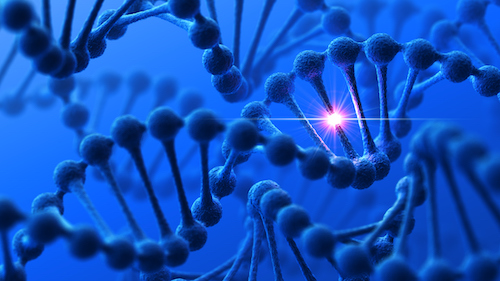
New Brunswick, N.J. November 17, 2021 – Germline testing checks an eligible person's DNA for genetic inherited mutations that could potentially increase the risk of developing cancers or other health problems. Researchers from Rutgers Cancer Institute of New Jersey and Dana-Farber Cancer Institute developed and evaluated a computational pipeline that utilizes information commonly provided in academic and commercial tumor sequencing assays to predict the origin of detected DNA alterations with the goal of helping clinicians in identifying germline alterations in patients.
Rutgers Cancer Institute investigators include lead author and postdoctoral fellow Nahed Jalloul, PhD, along with resident research member Hossein Khiabanian, PhD, who is senior author and also an associate professor of pathology and laboratory medicine at Rutgers Robert Wood Johnson Medical School. They share more about the work published in the November 17, 2021 online edition of JCO Precision Oncology. (https://ascopubs.org/doi/full/10.1200/PO.21.00279)
Why is this topic important to explore?
An effective strategy for treating a cancer patient should be developed based on an accurate molecular profile of their tumor. Accordingly, detection of genomic alterations in tumor specimens collected from patients using advanced DNA sequencing methods has become a routine part of clinical evaluation and treatment planning.
Recent studies have shown that a significant number of eligible patients are frequently overlooked for clinical germline testing because of complexities in determining their need for it. Pathogenic germline alterations can, however, be identified by tumor sequencing assays; therefore, inferring the origin of detected alterations can directly inform familial risk and potentially implicate the treatment strategy. Yet, clinical reports presented to clinicians lack critical information that can help accurately predict whether detected alterations are inherited in the germline and present in all cells or are somatic and only present in cancer cells.
Can you describe the results and what your team found?
First, using the data generated from tumor sequencing, we estimated the proportion of tumor cells to all cells that were sampled and sequenced from the tumor specimen. Then, using the estimated tumor content and each alteration’s sequencing data, we statistically predicted the mutational origin as either germline or somatic. Finally, to validate our approach, we compared the alterations’ predicted mutational origins with their true status provided by clinical germline testing showing that germline-versus-somatic status was imputed with an overall accuracy of 86 percent for pathogenic alterations with 65 percent sensitivity for germline and 88 percent specificity for somatic ones. Our approach improved on existing criteria which prioritize sensitivity at the cost of specificity and accuracy.
These results show that pathogenic germline variants are detected by tumor sequencing and analyzing their data in the context of specimens’ tumor cell content can precisely distinguish them from somatic alterations for identification of patient candidates for standard germline testing. We have also developed a user-friendly software package that may help clinicians analyze their patient’s data to guide their decision-making process for recommending clinical germline testing and, in some cases, alter treatment strategies.
What are the implications of these findings?
We currently use these methods for analyzing the data from patients who are being treated at Rutgers Cancer Institute and whose cases are presented at the Precision Medicine weekly molecular tumor board meeting. Based on continuous feedback from physicians, we are extending our analyses to sequential samples collected from individual patients at varying stages of treatment and are incorporating phylogenetic analyses to provide additional information on tumor evolution and response to therapy.
###
For journalists – contact:
Krista Didzbalis
Media Relations Specialist
732-507-8307
krista.didzbalis@rutgers.edu
For patient appointments/inquiries – contact:
844-CANCERNJ (844-226-2376)

